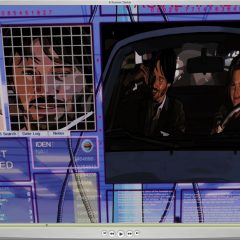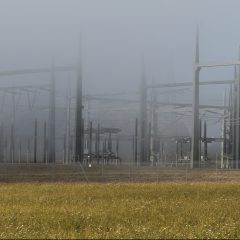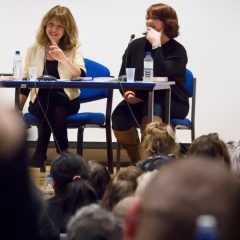A Scanner Darkly
The CCL's very own Dr Caroline Edwards was invited to participate in a panel discussion and screening of Richard Linklater's 2006 film adaptation of Philip K. Dick's classic novel, A Scanner Darkly (1977). The event was organised by the Vasari Research Centre for Art & Technology as part of their Digital Animation Series running in 2016-17. Linklater's film is a great example to consider with regards to digital animation: the film was shot in live action and then animated in post-production using a technique known as interpolated rotoscoping (watch the video below to learn more about this process). The film screening was introduced with a 45 minute panel discussion chaired by Dr Joel McKim (Lecturer in Media & Cultural Studies, Birkbeck) and Caroline was joined by Dr James Burton (Lecturer in Cultural Studies & Cultural History, Goldsmiths), who has published a book on Dick, titled The Philosophy of Science Fiction: Henri Bergson and the Fabulations of Philip K. Dick (Bloomsbury, 2015). Topics discussed included Dick's autobiographical experiences with hallucinogenics, the context of 1970s Californian counterculture, messianism and Dick's late religious tract, Exegesis, and the question of genre with regards to what kind of science fiction A Scanner Darkly might be understood to be pioneering. A podcast of the panel discussion is available below. Click on the SoundCloud file to listen to the discussion (it begins in medias res, shortly after the event had been introduced at the Birkbeck Cinema). Featured image by Duncan Creamer under a CC BY-NC-ND...
The Limits of Estrangement: a panel discussion
A panel discussion hosted by the Centre for Contemporary Literature, Birkbeck Thursday 2nd March 2017, 7:30-9 What can literature do to confront an increasingly turbulent and unpredictable world? What strategies of narrative and representation can best orient us? A long-standing argument for science fiction proposes that it offers a controlled estrangement of the real, permitting us to see the extremity of our reality more clearly and to extrapolate possible futures. But is it possible that reality is outrunning fiction? What is the role of dystopian narrative, when reality itself develops dystopian dimensions? Such questions will be taken up by three lecturers from the Department of English & Humanities: Mark Blacklock, Caroline Edwards and Mpalive Msiska, in conversation with Joseph Brooker. This event is free to attend but places are limited and booking is required, via this link. Image: Dystopia by Leonie Hochrein, used under a CC BY-NC 2.0...
Report: Eimear McBride in Conversation with Jacqueline Rose
by Joseph Brooker On 25th January 2017 the acclaimed novelist Eimear McBride came to Birkbeck for a public conversation with Professor Jacqueline Rose. One of the college’s largest lecture halls was filled by an audience keen to witness what was not just another book-tour stop but a notable meeting of minds, facilitated by a collaboration between Birkbeck Institute for the Humanities and the Centre for Contemporary Literature. Various relations can exist between creative writers and the critics who read them – from incomprehension to symbiosis. My colleague Professor Martin Eve, in his recent book Literature Against Criticism (2016), explores the ways in which recent fiction has competed with academic criticism for rhetorical sway over theoretical ideas. Yet Rose and McBride remind us of the possibility of a productive and sympathetic relation between artist and critic, as has often enough happened in the past – from Ruskin and Turner to Barthes and Robbe-Grillet. A particular critic can seem to be an artist’s ideal audience, or can take a particular role in paraphrasing the artist’s novelties and significance to a public; they might even, in a positive feedback loop, have a beneficial effect on the artist’s own understanding of what they’re doing. Rose was one of the first academics to speak in public on McBride’s first novel A Girl is a Half Formed Thing (2013), before reviewing her second novel The Lesser Bohemians (2016). At this event Rose commenced by speaking of how McBride’s work had affected her, and suggested that McBride was a writer she had been waiting for. (Presumably, on this model, one only fully discovers what one has been waiting for when it arrives.) In their different ways, both writers traverse strongly related territory: gender, sex, violence, abuse; psychic and ideological structures of power (notably, in McBride’s case, those of the Catholic Church); psychic troubles and breakdowns; and the way that all of these are enacted in language and literature. On the night, the discourses of Rose and McBride were slightly contrasting: one trading in eloquent long sentences, the other tending to brisk, down-to-earth replies. But a slight difference of idioms can be no bad thing, offering different ways of seeing and addressing the same issues. The conversation was neither narrowly academic in a way that excluded the language of creative writing, nor non-academic in a way that dismissed serious reflection, but a respectful, exploratory negotiation of ways of speaking about fiction. Here are a few specific, discrete moments from the conversation, roughly transcribed. Rose: This is the most terrifyingly anticipated second novel. McBride: At least by me. Rose: You are high-risk. McBride: I do my...




Recent Comments